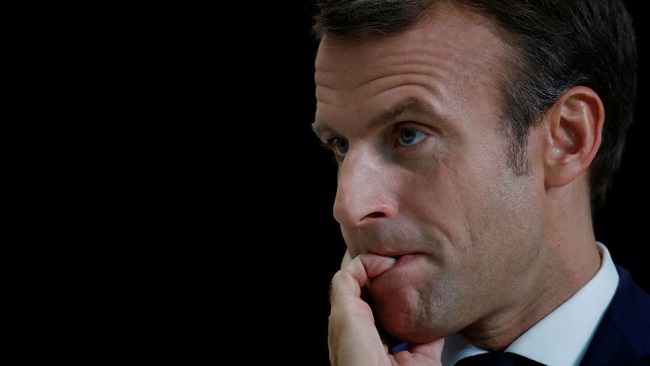France: President Macron lambasted at home after European Commission fiasco
A debacle, a cold shower and a slap in the face: French commentators spared no hyperbole in describing the rejection of France’s nominee for the European Commission, Sylvie Goulard, claiming Emmanuel Macron had been punished for his arrogance.
In a humiliating first for France, European lawmakers (MEPs) on Thursday voted overwhelmingly – by 82 to 29 – to refuse Goulard’s appointment for a broad economic portfolio covering industrial policy, defence spending, high tech and space.
Goulard is under investigation by the EU Anti-Fraud Office over allegations she and other MEPs from France’s centrist MoDem party used European Parliament funds to pay assistants based in France. French police have also questioned her over the claims, though she is yet to face charges.
The allegations forced Goulard to resign as France’s defence minister just weeks after her appointment in 2017, but she was still deemed fit to represent France in the EU’s powerful executive body – a case of double standards deemed insulting by many European legislators.
“If she was unfit to serve as a minister [in France], why did she apply for a similar position at the European level?” asked an editorial in left-wing daily Libération, denouncing a “deceitful distinction that clearly irked lawmakers unwilling to see European rules flouted”.
On top of a “severe lesson in humility”, Goulard’s snub marks a “lesson in democracy” for France, wrote the pro-EU, pro-business daily L’Opinion, adding: “Europe is not – or no longer – a democratic by-product in which to recycle those who have been ditched by national politics.”
The vote signaled not only “an unprecedented defeat for France”, concluded Le Figaro, the conservative daily; it also marked the French president as a “sore loser” who “blamed everyone but himself”.
‘Like a boomerang’
In characteristically unapologetic mode, Macron responded to Goulard’s rejection with a terse comment on “the resentment, perhaps the pettiness” at play in the European Parliament’s vote.
“I was told ‘your nominee is great’, […] and now they finally tell me they don’t want [her] anymore. I need that to be explained to me,” the visibly angered president told reporters in the French city of Lyon.
His words betrayed an admission of failure, wrote Le Monde, France’s daily of record: “The failure to grasp the extent of the European Parliament’s identity crisis, a crisis he fuelled without fully measuring its consequences, and one that has turned against him like a boomerang.”
The newspaper pointed to the role played by centrist forces like Macron’s in upending the traditional left-right dichotomy that has governed the parliament since its inception. It also highlighted the French president’s part in scuppering attempts by the assembly’s largest bloc, the conservative PPE, to place its candidate – Manfred Weber – at the helm of the European Commission.
Breaking with decades of tradition, Macron worked with German Chancellor Angela Merkel to outmanoeuvre MEPs and impose Ursula von der Leyen, a former German defence minister, as a compromise candidate for European Commission chief, a choice only grudgingly approved by the parliament in an unusually tight vote.
“Macron failed to realise to what extent the European Parliament felt violated by von der Leyen’s appointment,” European lawmaker Arnaud Danjean, a member of the PPE, told Le Monde.
French – or European – fiasco?
Goulard’s rejection signaled MEPs’ “willingness to take revenge on Macron, seen as the one who didn’t want the parliament candidate, Manfred Weber”, added Peter Nedergaard of Copenhagen University’s Centre for European Politics, in an interview with FRANCE 24.
The fact that Goulard herself “came across as arrogant and aggressive during her confirmation hearing” – stating that she would not resign even if placed under formal investigation – further vexed European lawmakers, Nedergaard added.
Only days earlier, the nominees for Hungary and Romania – a PPE member and a Socialist – were also turned down by parliament’s legal committee before they could even face their confirmation hearings. Feeling once again slighted, the EU’s eastern members demanded equal severity in Goulard’s case.
For Macron’s many foes, the chance to settle scores by shooting down a member of the centrist bloc that has altered the parliament’s balance of power was simply too tempting, said Le Monde. The fact that the French president had carved out a huge portfolio for his nominee, following intense haggling in Brussels, made the prospect all the more enticing for those craving to put him down.
“Macron’s team thought it could reshape the old world of European politics in the same way it wiped out French political parties two years ago,” said business daily Les Echos, for whom Goulard’s nomination “embodied the French arrogance so often decried”.
There were hints of that arrogance in the French government’s efforts to spin the Goulard fiasco as a “European crisis”, rather than a French debacle. On Friday, Amélie de Montchalin, the European affairs minister, said Goulard’s rejection opened “a major institutional crisis for Europe, because without a French commissioner, the Commission can’t get to work”.
Downplaying that threat, Nedergaard said the Goulard incident showed that the European Parliament was primarily interested in “proving it has muscle”, but would not block the formation of a Commission in the long run.
Source: France24





